Nemschoff Chairs, last of Sheboygan’s ‘Chair City’ makers, closes its doors after 75 years. Those close to the company reflect.

SHEBOYGAN — The last local business part of the “Chair City” phenomenon in Sheboygan, Nemschoff Chairs permanently closed its doors in September after more than 70 years of business.
Layoffs for 161 employees began in May, according to a notice MillerKnoll, parent company of Nemschoff, filed with the Department of Workforce Development.
The facility closure aimed to help the company "better align" resources, according to Kris Marubio, vice president of communications for MillerKnoll.
Marubio said the company assisted employees with career exploration. It made résumé books, held onsite job fairs with local employers like Kohler Company and Rockline Industries, and partnered with the Northeast Wisconsin Computer Center for free computer classes.
She added the company worked with DWD’s Displaced Worker division and a third party for retirement guidance.
A few employees will transfer to some of MillerKnoll’s six Michigan sites, although Marubio didn’t specify how many stayed on.
The roughly 208,000-square-foot Sheboygan plant is up for sale, according to Marubio. Operations will be spread across other MillerKnoll sites.
She did not respond to questions about how operations and staff were phased out.
From a local residential furniture-maker to a globally recognized manufacturer in the health care industry, Nemschoff staff, operations and ownership changed over the years. It adapted, often seeing signals in an evolving industry before others, and was one of the last furniture-makers in the area.
“I think that's a big testament to the people involved,” Paul Nemschoff, grandson of company founder Leonard Nemschoff and former vice president of sales, said. “It’s a big testament to the leadership and to our ability to really innovate and be unique, but be what the market needed.”
The Nemschoffs attributed a lot of success to their employees, making a point to support them and the community. Paul said his grandfather helped Ruth DeYoung Kohler II establish the John Michael Kohler Arts Center and his father pushed for development of the Sheboygan Marina and served on the Sheboygan County Economic Development Corporation.
“I'm proud of what Nemschoff did in Sheboygan. I'm proud of what Sheboygan did with Nemschoff,” Paul said.
He is now the vice president of global strategy and marketing at Michigan-based Haworth furniture company.
Here's background on the plant closure: 'Writing was on the wall': Union saw signs Nemschoff Chairs could shut down. Here's the latest on the Sheboygan plant's closure.
Emerging as a furniture leader, evolving with industry changes
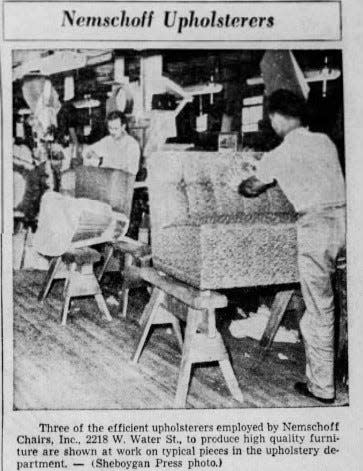
As many furniture companies shuttered doors — like the original Mattoon Manufacturing and Phoenix Chair companies — Nemschoff seemed to steadily progress through the bulk of its history.
Leonard Nemschoff founded the company in 1950, first manufacturing upholstered chairs and wooden rockers out of a factory on Virginia Avenue. Leonard, along with his father Julius and brother Earl, were active in the furniture business for 30 years before then.
Nemschoff Chairs experienced early success — acquiring Westfield Furniture Company, receiving an American Institute of Decorators international design award for a cradle chair and expanding to national distribution, according to Sheboygan Press clippings.
The company grew in 1978 with a 60,000-foot expansion to its Water Street facility, equipped with a conveyer system that could double production. It had more than 20 sales representatives across the country by 1980 and fitted another 20,000-foot facility on North 21st Street with automation by 1981.
Nemschoff expanded focus from upholstered to institutional furniture sold to the educational and health care industries, where it became a major supplier. Some products included residence hall furniture, sofas and plastic chairs molded by Dutchland Plastics, according to a Sheboygan Press clipping.
At one point, Nemschoff chairs could be found in Sheboygan City Hall, HSHS St. Nicholas Hospital and the Aurora Sheboygan Memorial Medical Center, according to Sheboygan Press clippings.
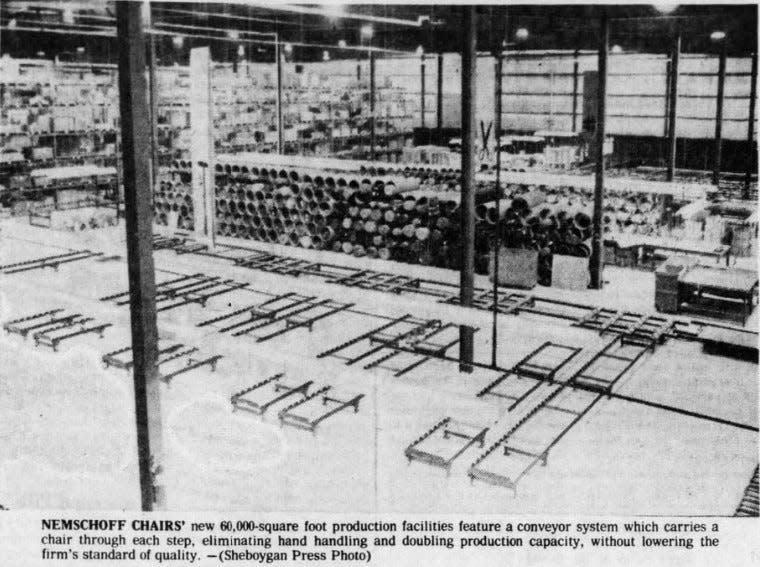
“Our company can make this further investment with confidence because of the warm, trusting relationships we enjoy with our knowledgeable employees,” Leonard told the Sheboygan Press in 1983.
The company looked out of state, adding showrooms in major cities like New York, Chicago and Dallas.
The move away from residential markets was partially the result of struggles in the industry. Nemschoff nearly faced bankruptcy in 1969, losing a customer base for its residential line to larger businesses.
Kohler family inheritance: Two of Herbert V. Kohler Jr.'s children inherit family properties in Sheboygan, Kohler
“It was a dismal time, a really bad period for us,” Leonard told the Sheboygan Press in 1990.
“I took it all very personally,” he said. “We had about 35 employees then, and I felt responsible to them and those who extended us credit, to keep the company together.”
Responding to market changes led the company to great success. It grew to a multimillion-dollar company, became lauded as having the largest catalog for institutional furniture and bolstering its workforce to more than 350 employees.
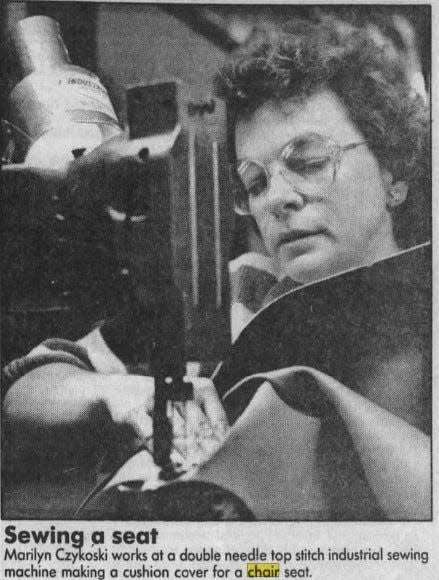
Integrating technology into the manufacturing process and leading product innovation also contributed to Nemschoff’s standout quality. Some included developing flame-retardant products, a modular seating arrangement and an upholstered chair with a removal back.
“A chair is more than just a chair when it is to be used in a public setting such as a doctor’s office waiting room or a student union,” former Press reporter Lisa McAlpine wrote in 1990. “It has to be constructed in such a way that it will withstand daily use and abuse, provide the customer with assured durability, replaceability and even flammability.”
Employees were 'like family' to Nemschoff leadership
As leadership passed through the Nemschoff family, employees continued to be viewed as the company's lifeblood. These values were often shared in Sheboygan Press interviews.
"Our people are more like family,” former CEO and president Mark Nemschoff told the Sheboygan Press in 1990. “We try to generate a family atmosphere here because it’s something we believe in.”
Karen Salm, 62, worked at Nemschoff Chairs for 34 years, starting in the receiving department and later rising to a management role.
She said Nemschoff was one of the best places to work in the Sheboygan area at the time. She liked that the company was family-oriented and accommodated to worker needs. The people were also great to work with, she added.
“There wasn't really a day that I didn't want to get up and go to work,” Salm said. “I couldn't have asked for a better place to work.”
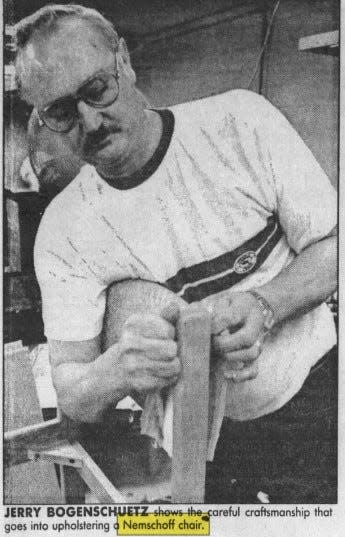
Mike Johnson, 61, had a similarly positive experience working for Nemschoff when it was family owned. He worked for Nemschoff Chairs for 16 years, starting at its Iowa facility in 2005 and moving to the Sheboygan site six years later. He focused on research and development, later becoming senior operations manager.
“Mark (Nemschoff) was kind of considered the Santa Claus,” Johnson said. When the company did well, so did the employees. He added they’d sometimes receive bonuses or vouchers for Christmas turkey during the holiday season.
The Nemschoff family was intentional about how it ran the company, Paul said about himself, his father and grandfather. Leonard passed away in 1998.
"At the end of the day, you're not only helping employees succeed, but you're helping the employees' families succeed,” Paul said. “You need to think about it more broadly than just that individual.”
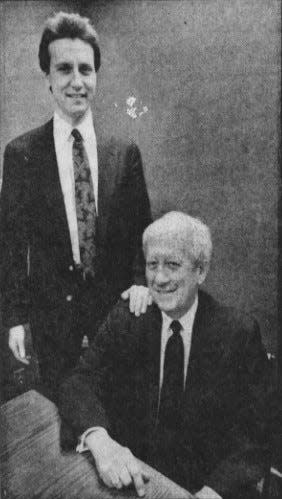

Furniture giant had 'bigger fish to fry' than small Wisconsin plant, says former Nemschoff employee
Salm felt a shift when the company was acquired by publicly owned Herman Miller in 2009, which merged with Michigan-based Knoll, Inc., in 2021 for $1.8 billion.
By the time of the acquisition, Nemschoff employed about 450 people in Sheboygan and 100 people in Sioux Center, Iowa. It had more than $90 million in annual revenues.
Mark and Paul told the Milwaukee Journal Sentinel in 2009 there were advantages to being part of a larger company like Herman Miller, and Nemschoff was struggling to find its place in the market. Herman Miller had eight facilities across the U.S., United Kingdom and China in 2009.
Nemschoff Chairs was acquired for about $32.1 million in cash and the issuance of 2,041,666 shares of the company’s common stock, according to an annual report.
"We needed to feel good about it," Mark told the Journal Sentinel about the acquisition. "Obviously, some money was important, too. But we needed to feel good about it."
Herman Miller had no intention of moving the company’s operations, understanding how tied the people were to their craft, according to the Journal Sentinel article.
The Iowa facility closed in 2012, seven years after Johnson started with the company. He said about four people transferred to Sheboygan.
“It’s pretty difficult trying to close a facility, trying to help people through this situation,” he said. “It was very difficult to see people leave knowing that the doors are shut."
Johnson said transitioning out of a privately held company was challenging. Target goals became a priority. Now, they had to answer to shareholders. He said Herman Miller “had bigger fish to fry than a little company in Sheboygan, Wisconsin.”
Salm felt Nemschoff employees weren’t recognized enough, she said, especially those with talents in diminishing fields, like upholstery.
“I think a lot of people out there towards the last couple years just thought they were another number,” Salm said.
There were initial plans to reduce staff in 2019, but Nate Meyer, IUE-CWA Local 800 president, told the Sheboygan Press those didn’t happen. He wasn’t sure why, but suspected it could’ve been related to buyouts, resignations or a change on Herman Miller’s part.
Marubio told the Sheboygan Press she didn’t have more information on the topic.
Celebrating 150 years: Vollrath Company commemorates 150th year with mural dedication
There was also a big turnover of upper management, Salm continued, a similar sentiment shared among union members, Meyer told the Sheboygan Press. This was one factor that made Salm and other employees suspect the company could close in the future.
“What hurts me is how many people that had maybe five to seven years left there and wanted to retire from there just like I was able to, and now they're probably struggling,” Salm said. "It's very hard to get on first shift again in this day and age, and when you’re 55-56 years old and to start over, I'm sure it's hard for them.”
Johnson said he has nothing against Herman Miller, it was a great company to work for. The company took care of the facilities and provided resources for workers. He noted challenges with the transition, though — moving to a publicly-held company, outsourcing labor and a dwindling focus on research and development.
Though Sheboygan’s information wasn’t specifically disclosed, Herman Miller’s overall research and development declined in 2019 until it merged with Knoll. MillerKnoll’s R&D has fluctuated since.
MillerKnoll disclosed several risk factors in its 2023 report, according to a Securities and Exchange Commission filing. Among them were external impacts of the economy and industry and associated debts with the Knoll acquisition that could interfere with future operations. Long-term debt was estimated at $1.37 billion, according to the report.
The company’s global workforce fluctuated since the acquisition, increasing from 7,600 employees in 2021 to 11,300 employees the following year. That declined by 400 workers at the time of the 2023 filing.
Salm and Johnson weren’t surprised Nemschoff was closing. With a decline in new products, which Johnson said is essential to staying in business, he could “see the writing on the wall,” and decided to leave a couple years ago.
"I needed to get out of the atmosphere that I was at, and I'm glad I left when I did because it was tough to shut the Iowa facility down," Johnson said. "It'd be the same way with the Sheboygan one."
He continued: “It's just nothing that I wanted to go through again in my life.”
Contact Alex Garner at 224-374-2332 or agarner@gannett.com. Follow her on X (formerly Twitter) at @alexx_garner.
This article originally appeared on Sheboygan Press: Nemschoff Chairs closes in Sheboygan, plant for sale in 'Chair City'
